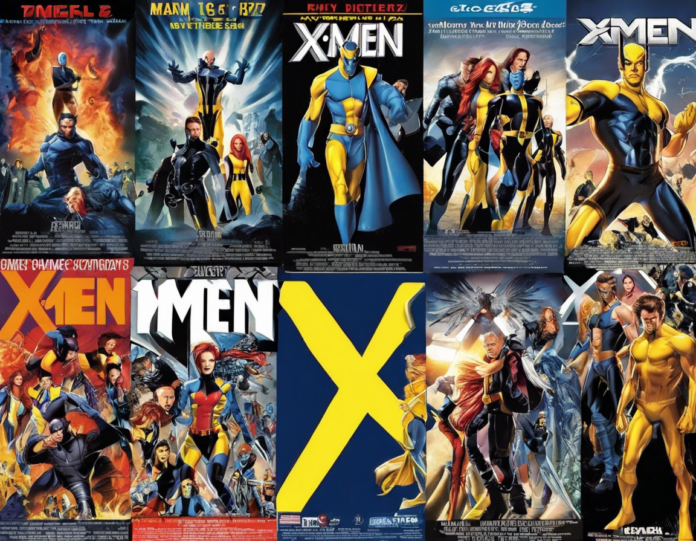The X-Men film series stands as one of the most iconic franchises in the superhero genre, captivating audiences with its blend of action, drama, and themes of identity and acceptance. Spanning nearly two decades and comprising over a dozen films, the X-Men universe has evolved and expanded, offering fans a rich tapestry of characters and storylines to enjoy. In this exploration of the X-Men film series, we will delve into its cinematic evolution, memorable moments, and the impact it has had on the superhero genre as a whole.
The Beginning: X-Men (2000)
The journey of the X-Men film series began in 2000 with the release of “X-Men,” directed by Bryan Singer. This film laid the foundation for what would become a successful franchise, introducing audiences to key characters such as Wolverine, Professor X, and Magneto. With its focus on themes of prejudice and acceptance, “X-Men” set the tone for the series, blending superhero action with social commentary.
Evolution and Expansion: X2, The Last Stand, and Origins
As the series progressed, it continued to explore the complex relationships between mutants and humans. “X2: X-Men United” (2003) expanded on the themes introduced in the first film, delving deeper into the characters’ backstories and relationships. “X-Men: The Last Stand” (2006) and “X-Men Origins: Wolverine” (2009) further explored the characters’ origins and motivations, delving into the darker aspects of the mutant world.
Reboot and Revamp: First Class and Days of Future Past
In 2011, the series took a new direction with “X-Men: First Class,” directed by Matthew Vaughn. This film served as a prequel to the original trilogy, exploring the early days of Professor X and Magneto’s friendship and their eventual fall from grace. The series continued to evolve with “X-Men: Days of Future Past” (2014), which brought together the cast of the original trilogy and the prequel series, creating a unique blend of past and future timelines.
The New Generation: Apocalypse and Dark Phoenix
The X-Men film series continued to push boundaries with “X-Men: Apocalypse” (2016) and “Dark Phoenix” (2019). These films introduced a new generation of mutants and explored themes of power, corruption, and redemption. While their reception was mixed, they marked a bold new direction for the series as it sought to reinvent itself for a modern audience.
The Spin-Offs: Logan and Deadpool
In addition to the main X-Men films, the series spawned several successful spin-offs. “Logan” (2017) offered a gritty, character-driven take on Wolverine’s story, earning critical acclaim and showcasing Hugh Jackman’s iconic portrayal of the character. “Deadpool” (2016) and its sequel “Deadpool 2” (2018) brought a fresh, irreverent humor to the superhero genre, redefining what a superhero film could be.
Impact and Legacy
The X-Men film series has left an indelible mark on the superhero genre, paving the way for other ensemble superhero films such as the Marvel Cinematic Universe and DC Extended Universe. It has also tackled complex themes of diversity, inclusivity, and the struggle for acceptance, resonating with audiences around the world.
The Future: X-Men in the MCU
With Disney’s acquisition of 20th Century Fox, the X-Men film series is set to be rebooted as part of the Marvel Cinematic Universe. Fans eagerly await the integration of their favorite mutant characters into the MCU, anticipating new storylines, crossovers, and interactions with iconic Marvel heroes.
Frequently Asked Questions (FAQs):
- What is the correct order to watch the X-Men films in?
-
The recommended viewing order is: X-Men (2000), X2: X-Men United, X-Men: The Last Stand, X-Men Origins: Wolverine, X-Men: First Class, The Wolverine, X-Men: Days of Future Past, Deadpool, X-Men: Apocalypse, Logan, Deadpool 2, Dark Phoenix.
-
Are all the X-Men films connected in the same universe?
-
While most of the X-Men films are connected in a shared universe, there are some standalone spin-offs such as “Logan” and “Deadpool” that exist outside the main continuity.
-
Who are some of the most iconic X-Men characters in the film series?
-
Some of the most iconic X-Men characters include Wolverine, Professor X, Magneto, Mystique, Storm, and Jean Grey.
-
What sets the X-Men film series apart from other superhero franchises?
-
The X-Men series is known for its exploration of complex themes such as prejudice, identity, and acceptance, setting it apart from more straightforward superhero narratives.
-
Is there a particular order to watch the X-Men films for the best understanding of the storyline?
- Watching the films in chronological order, starting with “X-Men: First Class” and progressing through the timeline, can provide a more coherent understanding of the overarching storyline.
In conclusion, the X-Men film series has been a groundbreaking and influential force in the superhero genre, captivating audiences with its rich characters, complex storylines, and thought-provoking themes. As the series looks towards a new era in the Marvel Cinematic Universe, fans can look back on the journey so far with fondness and excitement for what the future holds.

